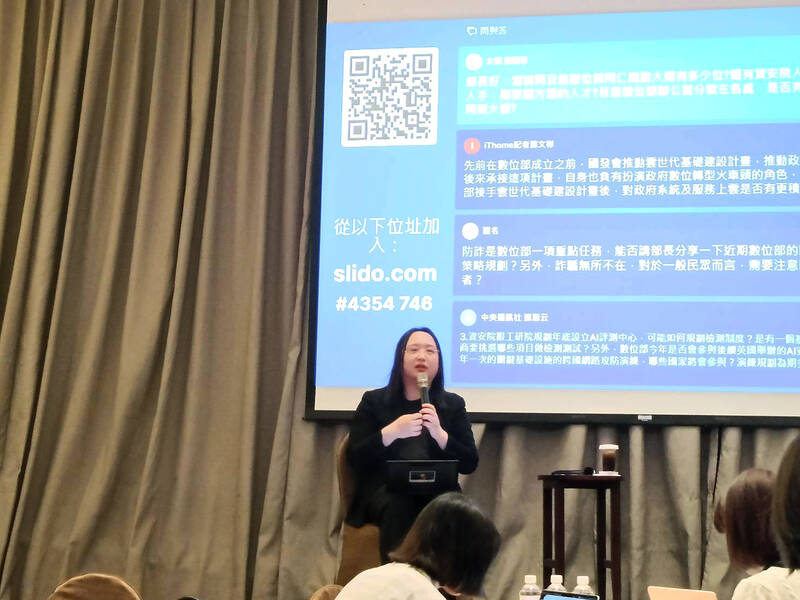Minister of Digital Affairs Audrey Tang (唐鳳) yesterday announced the release of the Wi-Fi 6E spectrum in Taiwan to facilitate more efficient Internet connections on home routers or wireless devices, such as smartphones and notebook computers.
The spectrum, which works in the frequency band from 5.945 GHz to 6.425 GHz, the same band as used in the EU, would enable two to three times faster Internet connection speeds, lower latency and higher capacity than current Wi-Fi 6 technology, Tang said at a media gathering that marked the one-year anniversary of the opening of the ministry.
No license would be required, she said.

Photo: Lee Chin-hui, Taipei Times
Unlike existing bands ranging from 2.4 GHz to 5 GHz, Wi-Fi 6E improves the user experience for not only computers, but also immersive technologies such as augmented reality and virtual reality, Tang said.
Wi-Fi 6E could also allow the transmission of data sets that are two to three times larger, making working from home and videoconferencing easier, she added.
The introduction of Wi-Fi 6E is in line with operational standards in nations such as the US, Canada, Brazil and Japan, as well as the EU, Tang said.
The National Communications Commission is to start taking applications from telecoms to operate Wi-Fi 6E devices after it completes the regulations for its use, she said.
Designated numbers could help avoid confusion and reduce the chance of people being scammed, she added.

When an apartment comes up for rent in Germany’s big cities, hundreds of prospective tenants often queue down the street to view it, but the acute shortage of affordable housing is getting scant attention ahead of today’s snap general election. “Housing is one of the main problems for people, but nobody talks about it, nobody takes it seriously,” said Andreas Ibel, president of Build Europe, an association representing housing developers. Migration and the sluggish economy top the list of voters’ concerns, but analysts say housing policy fails to break through as returns on investment take time to register, making the

‘SILVER LINING’: Although the news caused TSMC to fall on the local market, an analyst said that as tariffs are not set to go into effect until April, there is still time for negotiations US President Donald Trump on Tuesday said that he would likely impose tariffs on semiconductor, automobile and pharmaceutical imports of about 25 percent, with an announcement coming as soon as April 2 in a move that would represent a dramatic widening of the US leader’s trade war. “I probably will tell you that on April 2, but it’ll be in the neighborhood of 25 percent,” Trump told reporters at his Mar-a-Lago club when asked about his plan for auto tariffs. Asked about similar levies on pharmaceutical drugs and semiconductors, the president said that “it’ll be 25 percent and higher, and it’ll

CHIP BOOM: Revenue for the semiconductor industry is set to reach US$1 trillion by 2032, opening up opportunities for the chip pacakging and testing company, it said ASE Technology Holding Co (日月光投控), the world’s largest provider of outsourced semiconductor assembly and test (OSAT) services, yesterday launched a new advanced manufacturing facility in Penang, Malaysia, aiming to meet growing demand for emerging technologies such as generative artificial intelligence (AI) applications. The US$300 million facility is a critical step in expanding ASE’s global footprint, offering an alternative for customers from the US, Europe, Japan, South Korea and China to assemble and test chips outside of Taiwan amid efforts to diversify supply chains. The plant, the company’s fifth in Malaysia, is part of a strategic expansion plan that would more than triple

Taiwanese artificial intelligence (AI) server makers are expected to make major investments in Texas in May after US President Donald Trump’s first 100 days in office and amid his rising tariff threats, Taiwan Electrical and Electronic Manufacturers’ Association (TEEMA, 台灣電子電機公會) chairman Richard Lee (李詩欽) said yesterday. The association led a delegation of seven AI server manufacturers to Washington, as well as the US states of California, Texas and New Mexico, to discuss land and tax issues, as Taiwanese firms speed up their production plans in the US with many of them seeing Texas as their top option for investment, Lee said. The